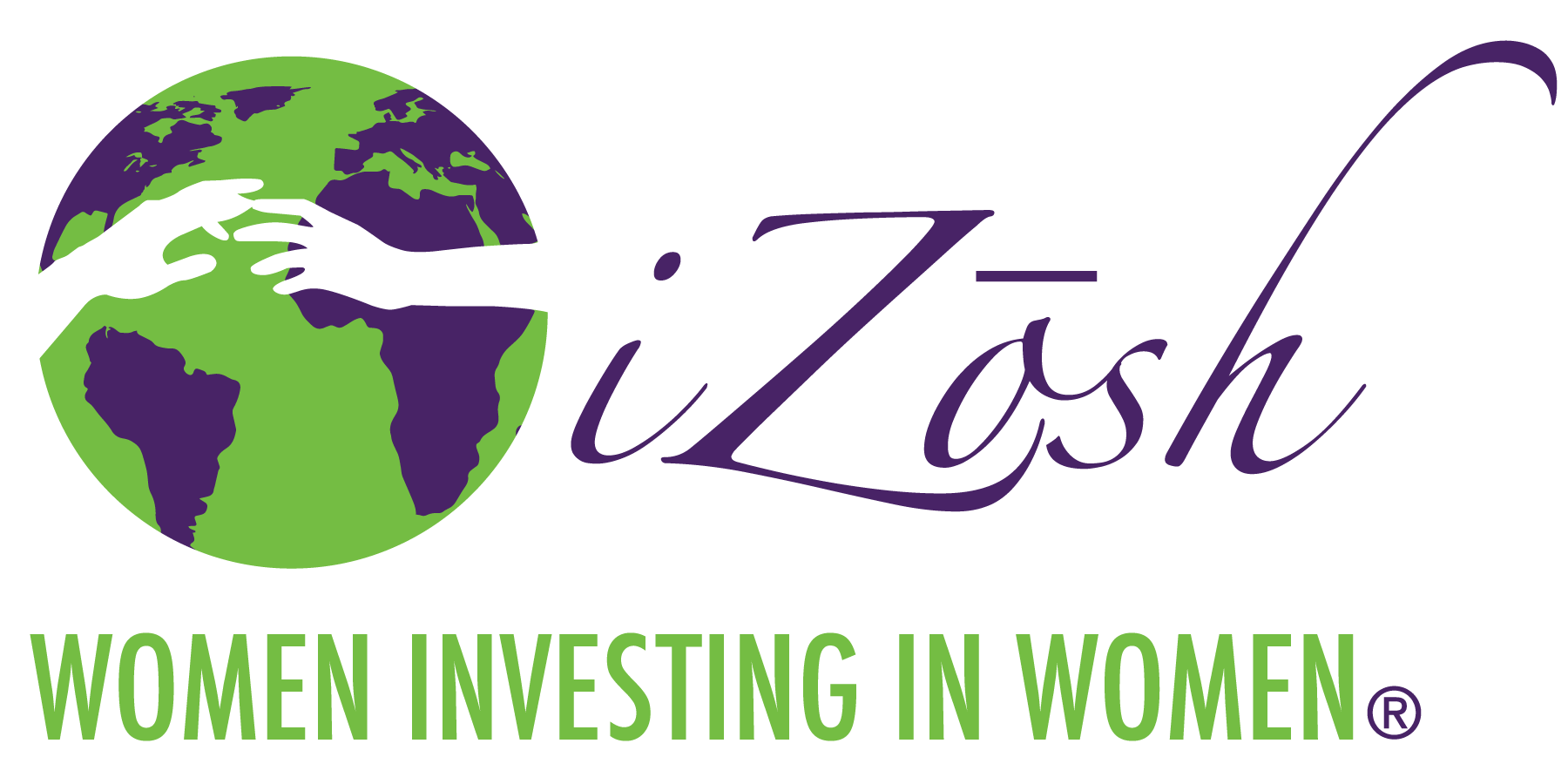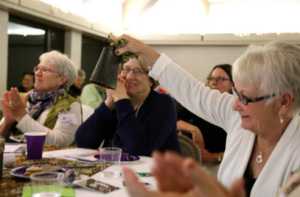 On October 24th, we held our seventh iZōsh® Event, which was one of the most successful to date. Over 150 women from around Ann Arbor gathered to gift a record $13,345 to 39 entrepreneurial women in extreme poverty. That brings our total to $74,864 to 182 women who are making a difference in their lives.
On October 24th, we held our seventh iZōsh® Event, which was one of the most successful to date. Over 150 women from around Ann Arbor gathered to gift a record $13,345 to 39 entrepreneurial women in extreme poverty. That brings our total to $74,864 to 182 women who are making a difference in their lives. 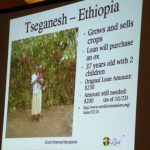 Check out the evening’s recipients and our photos from the evening! Remember, each of these women represents a life changed not just for her, but for her family and community as well! We are so inspired by their tenacity, and honored to assist in their own journeys In addition to choosing loan recipients, both in stone voting and around the tables, we took part in an exercise that allowed us to experience what it is like to be a part of a
Check out the evening’s recipients and our photos from the evening! Remember, each of these women represents a life changed not just for her, but for her family and community as well! We are so inspired by their tenacity, and honored to assist in their own journeys In addition to choosing loan recipients, both in stone voting and around the tables, we took part in an exercise that allowed us to experience what it is like to be a part of a 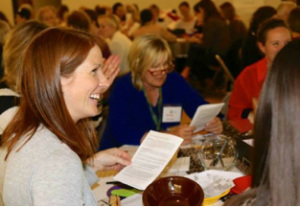 Tanzanian Savings Group. Many were struck by just how small the dues were which allowed for a woman to begin her venture. Also, the exercise came to life when one of the women portrayed in the exercise turned out to be a friend of our speaker, Mercy Niwe.
Tanzanian Savings Group. Many were struck by just how small the dues were which allowed for a woman to begin her venture. Also, the exercise came to life when one of the women portrayed in the exercise turned out to be a friend of our speaker, Mercy Niwe.
“Poverty has a face and that face is the face of a woman,” Mercy reminded us throughout the night.  Mercy was born in Uganda, one of nine children. She told the story of her mother, who was married off at 17 to a wealthy man twice her age who already had four wives. Her mother had nine children and was determined to give them a chance at a life that was better than what she had experienced. After being abandoned by her Muslim husband for practicing Christianity, Mercy’s mother decided to start a savings group. She began by supplying corn to a school, which eventually allowed her to feed and educate all her children. Mercy explained that some people in African countries can be driven by fear or spiritual beliefs, but that Savings Groups help create behavior change: you can save, children can go to school, you can have access to markets, etc. Other villages see these changes (such as a village using iron sheets on their roofs) and seek out how to emulate them. Groups such as World Vision are not going to these places to do magic, Mercy said, people already have their communities. They just need someone to come help organize them. One group told her, “Mercy, we won’t need you in three years. We are saving more than you loan to us!” When approaching a village, it is important to seek to be respectful of the culture, of men and of women, of the local government and chief before rolling out a savings group. She acknowledges that these groups work best in social type countries. By the time iZōsh enters the economic loan scene, she explained, loan recipients have already been a part of a Savings Group and had some entrepreneurial training. Therefore, the women we extend loans to are better positioned for success, and all our recipients have proven this to be true.
Mercy was born in Uganda, one of nine children. She told the story of her mother, who was married off at 17 to a wealthy man twice her age who already had four wives. Her mother had nine children and was determined to give them a chance at a life that was better than what she had experienced. After being abandoned by her Muslim husband for practicing Christianity, Mercy’s mother decided to start a savings group. She began by supplying corn to a school, which eventually allowed her to feed and educate all her children. Mercy explained that some people in African countries can be driven by fear or spiritual beliefs, but that Savings Groups help create behavior change: you can save, children can go to school, you can have access to markets, etc. Other villages see these changes (such as a village using iron sheets on their roofs) and seek out how to emulate them. Groups such as World Vision are not going to these places to do magic, Mercy said, people already have their communities. They just need someone to come help organize them. One group told her, “Mercy, we won’t need you in three years. We are saving more than you loan to us!” When approaching a village, it is important to seek to be respectful of the culture, of men and of women, of the local government and chief before rolling out a savings group. She acknowledges that these groups work best in social type countries. By the time iZōsh enters the economic loan scene, she explained, loan recipients have already been a part of a Savings Group and had some entrepreneurial training. Therefore, the women we extend loans to are better positioned for success, and all our recipients have proven this to be true.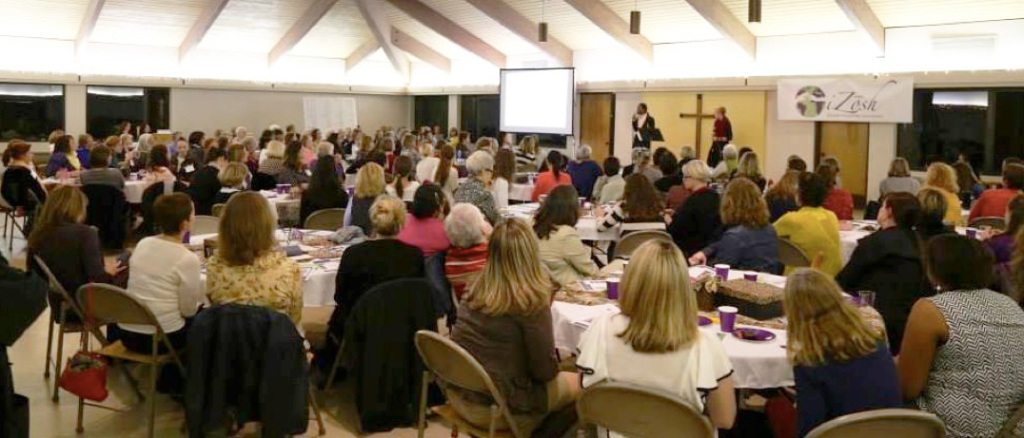 “How is poverty different in the United States than in rural parts of Africa? Here, public goods work for you – electricity, water, etc. That is a luxury in those parts of Africa. That is poverty.” Mercy went on to describe the economic ladder and its various rungs, and degrees of poverty. “We want to make sure they are climbing up and not falling back down. To stay resilient.” Lastly, she wrote to us a couple days later and exhorted, “With so many women in developing countries facing challenges with extreme poverty, it is very encouraging to see women get together to do something about ‘it’ – iZōsh is phenomenal. Keep up the good work!” With your contribution, we are helping to insure that the women we grant loans to are indeed able to rise and continue to rise on that ladder.
“How is poverty different in the United States than in rural parts of Africa? Here, public goods work for you – electricity, water, etc. That is a luxury in those parts of Africa. That is poverty.” Mercy went on to describe the economic ladder and its various rungs, and degrees of poverty. “We want to make sure they are climbing up and not falling back down. To stay resilient.” Lastly, she wrote to us a couple days later and exhorted, “With so many women in developing countries facing challenges with extreme poverty, it is very encouraging to see women get together to do something about ‘it’ – iZōsh is phenomenal. Keep up the good work!” With your contribution, we are helping to insure that the women we grant loans to are indeed able to rise and continue to rise on that ladder.
